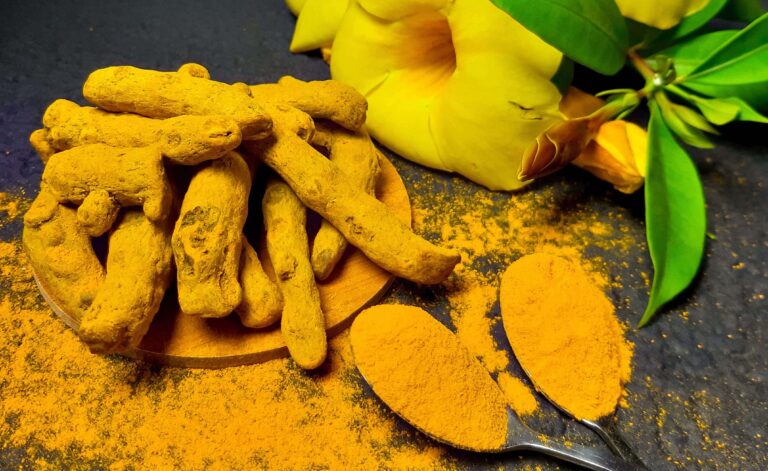7 Awesome Health Benefits of Turmeric
By Herbalist M Salim Khan

Turmeric has properties that can help prevent many diseases, including many serious ones.
This article lists 7 major health benefits of turmeric. Stay tuned!
What is turmeric?
Turmeric is a bright yellow root that has been used for thousands of years as a spice in curries. It has also been referenced in many ancient medical traditions, such as Tibb, Chinese and Ayurveda.
Essentially, turmeric is a compound obtained from the rhizome of an Asian herbaceous plant and used as a yellow food colouring and spice, usually in traditional curries.
How does Turmeric Work?
The active ingredient in turmeric is curcumin, which is a yellow pigment found in the root of the plant Curcuma longa. It’s also known as Indian saffron and has been used since ancient times in India, China, Africa, Europe and North America.
Curcumin has been hailed to possess properties that can help prevent many diseases, including many serious and long-term ones.
What Is Curcumin?
Turmeric is one of the most researched herbs in medicine, and curcumin is by far the most studied ingredient in it. Curcumin, a phytochemical found in turmeric, contains a unique chemical structure with potent antioxidant activity and a wide array of health benefits.
Curcumin has many powerful biological properties. Research suggests that turmeric can reduce the risk of cancer, improve liver function and help with inflammation and pain. Taken in large amounts, however, can upset the stomach and thin the blood.
What are the health benefits of Turmeric?
There are plenty of different health benefits for turmeric. These include better skin quality, and anti-inflammatory properties. People use turmeric in a variety of ways to help improve their overall health and lifestyle quality. Mentioned below are some of the many benefits of turmeric.
First Health Benefit of Turmeric
Turmeric can improve liver function
Turmeric can help fight free radicals with its antioxidant properties. Hence why it has been known to help prevent liver damage caused by overuse of potent medicines.
Source: medicalnewstoday.com
Second Health Benefit of Turmeric
Turmeric can aid digestion
Curry powder contains turmeric because of its delicious flavour and health benefits. Turmeric is good for a person’s digestive system, thanks to the powerful antioxidants and anti-inflammatory capabilities. In fact this essence that gives curry powder its distinct taste can improve the body’s ability to digest food. There is adequate data available to indicate that turmeric is undoubtedly good for the gut.
Third Health Benefit of Turmeric
Potential protection from Alzheimer’s and Arthritis
Multiple studies suggest that curcumin has cancer-combating effects. In an article on the Weizmann Institute of Science’s website, it states: “The results were unequivocal. The curcumin inhibited by itself the growth of many cancer cell lines and triggered the death of some of them” (Weizmann).
A number of research studies have shown that it works just as well for reducing joint inflammation and pain.
Turmeric has been traditionally used for hundreds of years by people from India in the Ayurveda system of medicine. It is thought to be a natural remedy for the many different symptoms that come with arthritis and joint pain. However, more research is needed to confirm this.
Fourth Health Benefit of Turmeric
Turmeric can improve brain health
While there has yet to be conclusive evidence as to whether or not curcumin supplements actually do positively affect the human brain, recent studies seem to indicate that taking these supplements may help prevent neurodegenerative diseases like Parkinson’s disease and dementia.
Turmeric is used to add colour and flavour to food, but it can also be used for medicinal purposes. For example, its active ingredient curcumin helps reduce inflammation and pain, desensitise plants from bacteria and fungi, and fight off cancer cells. In fact, it may even have antioxidant properties that help the body function better. However, turmeric should not be consumed by pregnant women because it may increase risk of miscarriage. Large amounts may cause stomach upset or intestinal bleeding. People should consult with a physician prior to eating turmeric for medicinal purposes (or consumption in any manner).
Source: forbes.com
Fifth Health Benefit of Turmeric
Turmeric can lower blood pressure
Turmeric has also been said to help lower blood pressure, because it improves the function of the endothelial cells that line the pipes inside our arteries. A reduction in inflammation from curcumin may also help lower blood pressure as other studies have shown.
Turmeric root has been known to help lower blood pressure in part because of its high levels of the phytochemical curcumin which has been linked to improved endothelial cell function.
Sixth Health Benefit of Turmeric
Turmeric can improve skin health
One of the most beneficial ingredients to ever be used in skin care products, turmeric can help nourish and protect your skin from harmful external factors. It’s been used in traditional Indian medicine for centuries as a way to treat a number of physical ailments, including several related to the skin.
The external colour of turmeric is what usually attracts the eye. It’s hard to ignore its yellow-orange hue and earthy scent, which is why it is so commonly used as a spice in traditional Indian recipes. Known for its anti-inflammatory benefits, it has also been used to treat skin conditions such as skin rashes and eczema in natural home remedies that some say are gentler on sensitive skin than the ones you can find off-the-shelf at your local chemist.
Seventh Health Benefit of Turmeric
Turmeric can aid in cancer
Studies on cancer cells in the lab have shown that curcumin may have anti-cancer properties. At high concentrations, it seems to be able to kill cancer cells and prevent new ones from growing. It has the best effect on breast cancer, colon cancer, stomach cancer and skin cancer cells.
Though it is a powerful antioxidant, there is no medically established evidence to show that either turmeric or curcumin can prevent or remedy cancer.
Source: cancerresearchuk.org
Contraindications
With so many great supports for the stomach, it’s no wonder that turmeric is popular for supporting digestion. However, there are some people who do experience negative side effects from too much of a good thing. Some participants in studies with turmeric had reportedly developed stomach irritation. This was due to the fact that curcumin causes more gastric acid production which can be difficult for some people to tolerate.
While the biology of turmeric may be beneficial in some ways, large doses can make one’s stomach upset, thin the blood and could make parturition more difficult. It is also very hard to consume sufficient amounts to be effective with just food. While many medicinal herbs are considered natural substances that alleviate some health problems, they can also cause unexpected side effects in some individuals. As such, you should consult a physician prior to taking any alternative herbal medications.
Source: medicalnewstoday.com
How Should You Take Turmeric?
It is difficult to assess a turmeric dosage due to poor solubility. It is almost always recommended that people consume turmeric through diet rather than take a specific medical dosage of this spice blend.
Conclusion
The major active ingredient in the turmeric plant, curcumin, is thought to have neuroprotective and antioxidant properties; however, there are still many areas of the therapeutic effects of turmeric that need to be researched in detail before any solid conclusions can be drawn about it’s benefits or side-effects.
Herbalist M. Salim Khan M.D. (M.A.) M.H. D.O. is an international authority on natural medicine – especially the universal healing tradition of Tibb [Whole-Person Healthcare & Medicine]. He has been practising herbal medicine, naturopathy, nutrition and iridology for over 40 years.
